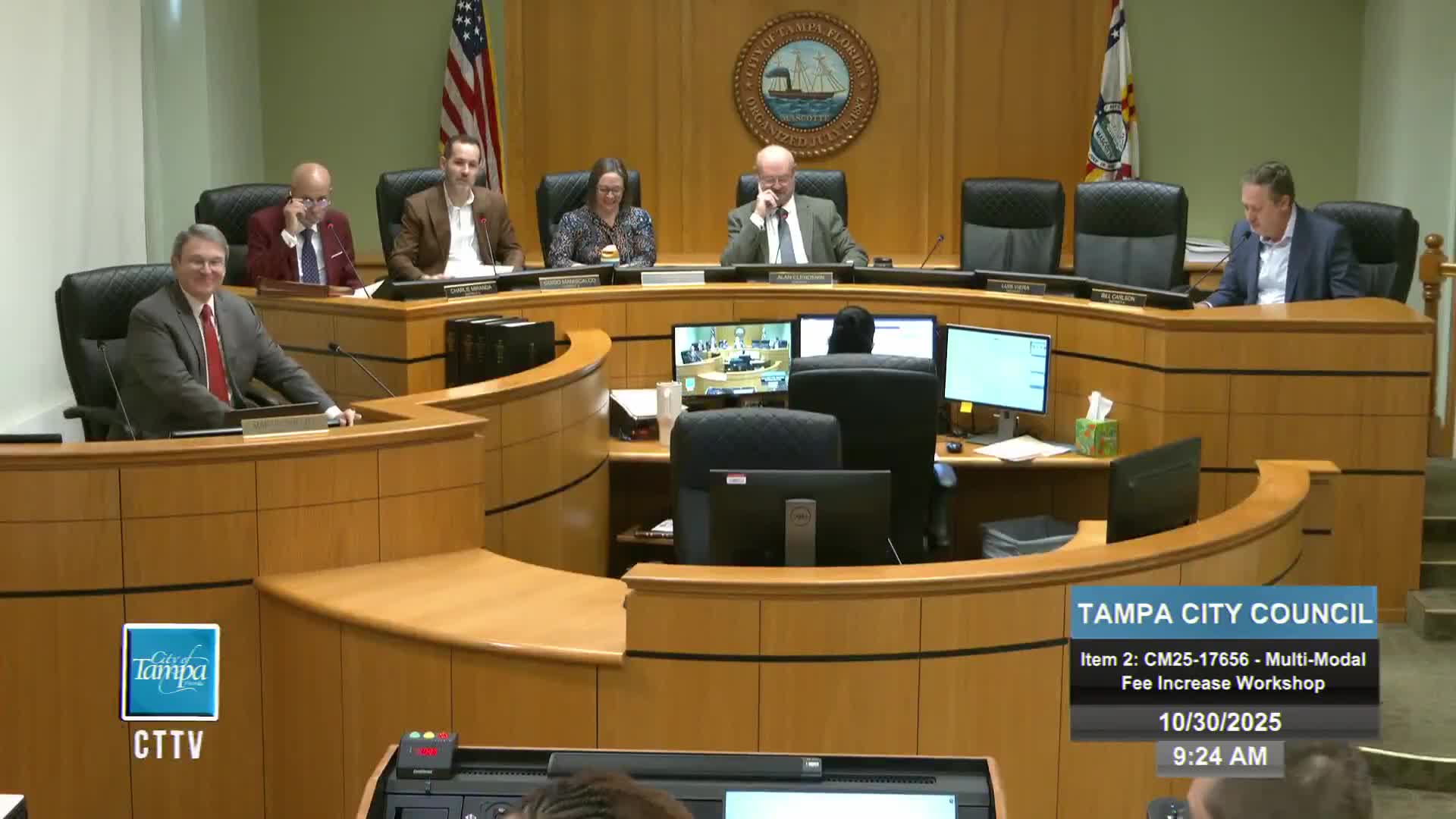Tampa council schedules more hearings after second workshop on multimodal impact fees
Get AI-powered insights, summaries, and transcripts
Subscribe
Summary
Tampa City Council on Friday held a second publicly noticed workshop on the city's multimodal transportation impact fee, during which staff and outside consultants described a demonstrated-needs study and preliminary fee calculations and council members scheduled follow-up briefings and ordinance hearings.
Tampa City Council on Friday held a second publicly noticed workshop on the city's multimodal transportation impact fee, during which staff and outside consultants described a demonstrated-needs study and preliminary fee calculations and council members scheduled follow-up briefings and ordinance hearings.
Emma Gregory, the city's senior assistant city attorney, told the council that "Section 163.31801, Florida Statutes, authorizes local governments to impose impact fees," and summarized the statutory limits and the extraordinary-circumstances pathway that would be required to raise fees by more than 50 percent. Consultant Catherine Tellez said the fee schedule has not been changed since 1989 and that updated trip-generation rates, construction-cost escalation and projected growth produce a larger calculated 'ceiling' for many land uses across the city's six fee districts.
At the workshop, staff framed the issue as technical and legal: the study updates trip generation, trip length and capital-cost assumptions and identifies transportation projects that, under state law, could be funded by a city multimodal fee (for example: new sidewalks, intersection modifications, traffic-signal hardware, and certain transit facilities). Tellez and interim Mobility director Brandon Campbell emphasized that the fee is assessed on new or intensifying development at permit issuance and is not charged to existing residents.
Council members pressed staff on phasing and incentives. Councilman Maniscalco and others said they favor a phase-in rather than an immediate large increase; Councilman Carlson proposed using fee reductions to incentivize higher-density or affordable housing near transit corridors. Staff said the ordinance could include a voluntary phase-in and reductions targeted to city priorities.
Public speakers included homebuilders, developers and residents. Several developers warned that sharp, rapid increases would be passed through to buyers and would compound housing-affordability pressures; others said the study and statutory path justify an update. Residents and advocates urged protections for low-income neighborhoods and asked the council for public transparency and an independent review of spending. "This increase would pass straight through to new homebuyers, hitting my generation the hardest," said Luke Sirak, a 25-year-old Tampa native during public comment.
Actions and next steps
- Councilman Maniscalco made and Councilman Viera seconded a motion to waive rules and allow an additional staff report on Nov. 20 that presents updated fee tables and explanatory materials; council approved the motion (recorded as "Ayes have it"). - Councilwoman Hertag moved and Councilman Viera seconded a motion to hold space on the Dec. 4 and Dec. 18 agendas for potential ordinance readings regarding multimodal-fee adjustments; council approved the hold unanimously.
Staff said they will provide peer-city comparisons, the draft Nexus/needs study, a matrix of calculated ceilings by district and land use, and meet individually with council members before Nov. 20. The council also discussed statutory phase-in options (0'25%, 26'49% and 50%+ categories) and the 90-day statutory waiting period for effective dates.
Why it matters
The city has not updated the fee schedule in decades. Staff and the consultant argued that construction-cost escalation, changing travel behavior and projected growth together justify recalculating the fee. Opponents say a large increase now could worsen housing affordability, while supporters say the update will ensure new development pays its measured share of transportation costs.
What the staff will provide next
Staff committed to posting the draft Nexus calculations and district tables online before Nov. 20, to provide a top-10 peer-city comparison and to circulate the ordinance language for council and public review before any first reading. Council directed staff to show several phasing options and any proposed targeted reductions (for example, for affordable units or transit-oriented projects).
